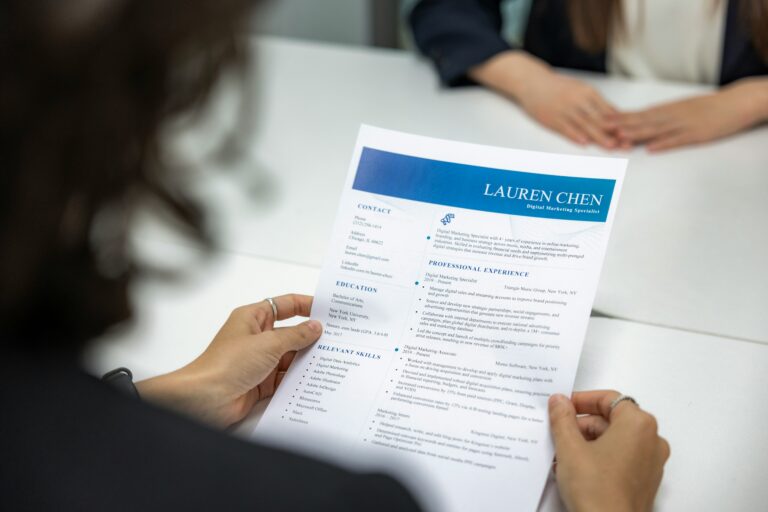Preparing for the final round of an interview can be a daunting task. This stage often involves meetings with senior executives, a detailed review of your skills and experiences, and a final assessment of whether you are the right fit for the company. Success in this phase requires thorough preparation, strategic thinking, and a confident, polished presentation. Here’s a comprehensive guide to help you prepare for the final round of your interview.
Understanding the Final Round
The final round of interviews typically includes a mix of behavioral questions, technical assessments, and cultural fit evaluations. It is designed to give employers a deeper insight into your qualifications and how you might perform in the role. You may meet with higher-level executives, including department heads or even the CEO, who will want to ensure that you align with the company’s vision and values.
1. Review the Job Description Thoroughly
Before your final interview, revisit the job description. Make sure you fully understand the responsibilities and requirements of the position. Identify the key skills and experiences the employer is seeking and prepare to demonstrate how you meet these criteria with specific examples from your past work.
2. Research the Company and Its Culture
Having in-depth knowledge about the company is crucial. This involves:
- Company Background: Know the company’s history, mission, values, and recent achievements. Check their website, read news articles, and review their social media profiles.
- Industry Insights: Understand the industry trends, the company’s position in the market, and its competitors.
- Corporate Culture: Research the company’s culture by looking at employee reviews on platforms like Glassdoor, and understanding their work environment and values.
3. Reflect on Your Past Experiences
Consider your past job experiences and how they have prepared you for this role. Identify specific projects, challenges, and achievements that highlight your qualifications. Use the STAR method (Situation, Task, Action, Result) to structure your responses, making them clear and impactful.
4. Prepare for Behavioral Questions
Behavioral questions are designed to assess how you’ve handled situations in the past and predict your future behavior. Common behavioral questions include:
- “Tell me about a time when you faced a significant challenge at work. How did you handle it?”
- “Describe a situation where you had to work with a difficult team member.”
- “Give an example of a goal you set and how you achieved it.”
Prepare thoughtful responses using the STAR method, ensuring they are relevant to the role you are applying for.
5. Brush Up on Technical Skills
Depending on the role, you may face technical questions or tasks. Review the key skills listed in the job description and practice any relevant techniques or software. If the role involves coding, problem-solving, or specific technical knowledge, make sure you’re well-prepared to demonstrate your proficiency.
6. Plan Your Questions
The final interview is also an opportunity for you to assess whether the company is the right fit for you. Prepare thoughtful questions that demonstrate your interest in the role and the company, such as:
- “What are the biggest challenges the team is currently facing?”
- “How do you measure success in this role?”
- “Can you describe the company’s approach to professional development?”
7. Practice, Practice, Practice
Practice your answers to potential questions with a friend, family member, or mentor. This will help you refine your responses and gain confidence. Conduct mock interviews, focusing on your body language, tone, and clarity of speech.
8. Dress Appropriately
Choose professional attire that aligns with the company’s dress code. When in doubt, it’s better to be slightly overdressed than underdressed. Ensure your clothes are clean, pressed, and well-fitted.
9. Prepare Your Documents
Bring several copies of your resume, a list of references, and any other relevant documents, such as a portfolio or certifications. Organize them neatly in a professional folder or binder.
10. Arrive Early
Plan to arrive at least 10-15 minutes early for your interview. This shows punctuality and gives you a few moments to compose yourself before the interview starts.
11. Mind Your Body Language
Non-verbal communication is critical during an interview. Maintain good eye contact, offer a firm handshake, and sit up straight. Avoid fidgeting and ensure your gestures are open and positive.
12. Be Ready to Discuss Salary and Benefits
The final interview might involve a discussion about salary and benefits. Research typical salaries for the role in your industry and region. Prepare to negotiate confidently but be flexible and realistic.
13. Demonstrate Enthusiasm and Positivity
Show your excitement about the role and the company. A positive attitude can be contagious and can leave a lasting impression on your interviewers.
14. Follow Up
After the interview, send a thank-you email to each person you met. Express your appreciation for the opportunity to interview and reiterate your interest in the role. This is a chance to leave a final positive impression and keep yourself top of mind.
Example Questions and How to Handle Them
Behavioral Questions
- Question: “Tell me about a time when you had to lead a project under a tight deadline.” Answer Strategy: Use the STAR method. Describe a specific project, your role in it, the actions you took to ensure timely completion, and the results of your efforts.
- Question: “Describe a situation where you disagreed with a team member. How did you handle it?” Answer Strategy: Explain the situation briefly, focusing on the actions you took to resolve the disagreement and the positive outcome. Highlight your communication and problem-solving skills.
Technical Questions
- Question: “Can you walk me through how you would approach solving [specific technical problem]?” Answer Strategy: Break down your thought process step-by-step. Demonstrate your technical knowledge and logical approach to problem-solving.
- Question: “What tools or software are you proficient in that are relevant to this role?” Answer Strategy: List the tools and software you are skilled in, providing examples of how you have used them in past projects or roles.
Situational Questions
- Question: “How would you handle a situation where you have to meet an urgent deadline but lack the necessary resources?” Answer Strategy: Explain how you would prioritize tasks, communicate with stakeholders about resource limitations, and find creative solutions to meet the deadline.
- Question: “What would you do if you were assigned a task that is outside your expertise?” Answer Strategy: Emphasize your willingness to learn, seek guidance from knowledgeable colleagues, and take proactive steps to acquire the necessary skills or knowledge.
Final Tips
- Stay Calm and Confident: Nervousness is normal, but try to stay calm and collected. Confidence comes from preparation, so trust in the effort you’ve put in.
- Be Yourself: Authenticity is key. Be genuine in your responses and let your true personality shine through.
- Listen Carefully: Pay attention to the questions being asked and ensure your responses are relevant. Active listening demonstrates respect and engagement.
- Show Gratitude: Always thank the interviewers for their time and consideration.
Conclusion
Preparing for the final round of an interview requires a blend of research, practice, and self-awareness. By thoroughly understanding the role and the company, reflecting on your experiences, and practicing your responses, you can approach the interview with confidence and poise. Remember, the final round is not just about assessing your fit for the company, but also determining if the company is the right fit for you. Good luck!





